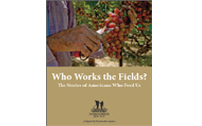As the debate over our nation’s immigration policy takes center stage, Rep. Mike Thompson (D-St. Helena) of Napa County has the opportunity to help shape a new national immigration policy that improves conditions for farmworkers, agricultural employers, and consumers in California and across the country.
In early 2013, representatives of agricultural workers and employers, working with a bipartisan quartet of senators that included California’s Sen. Dianne Feinstein, negotiated a hard-fought compromise on immigration policy addressing the needs of agricultural stakeholders and our nation’s food security. In June, the Senate included that agreement in its bipartisan immigration reform legislation.
The House Judiciary Committee, chaired by Rep. Bob Goodlatte (R-VA), ignored the stakeholder agreement and instead approved Goodlatte’s Agricultural Guestworker Act, which would expand employer access to exploitable and cheap guestworkers.
Undocumented immigrants compose more than half of the farm labor force nationally, but there are still hundreds of thousands of U.S. citizens and legal permanent residents working on farms in California and elsewhere. This flawed Goodlatte bill would incentivize and allow employers to displace U.S. workers by providing expanded access to foreign guestworkers who work for less.
That’s bad for both U.S. workers and for the guestworkers left to do the work. Goodlatte’s bill is both anti-U.S. worker and anti-immigrant; it can be stopped, though, with the support of members like Congressman Thompson.
A vineyard owner and co-founder of the Congressional Wine Caucus, Rep. Thompson knows the value of agriculture to California and the nation, and understands the imperative of a stable, productive farm labor force. With an annual output of more than $43 billion, California is by far the country’s largest producer of labor-intensive fruits, vegetables and dairy products.
The value of California’s agricultural exports has grown rapidly in the last decade, reaching a record-breaking $16.7 billion. Immigrant farmworkers are a big part of that continued success.
Instead of creating armies of “guests” to harvest our food, it’s time to modernize agricultural labor by granting the farmworkers already on the job a road map to legal immigration status and citizenship.
The Goodlatte guestworker act does the opposite by marginalizing farmworkers. Undocumented workers already in the fields would essentially be required to self-deport, with a slim hope of obtaining a new job offer and guestworker visa.
The bill would cause farmworkers with spouses and children (many of them citizens) living here in the U.S. to suffer separation and hardship. Such destabilization of the workforce also could disrupt our food supply.
The Goodlatte program would allow employers to bring in 500,000 new agricultural guestworkers each year in addition to those undocumented workers who return home and are brought back on guestworker visas. Neither the future farmworkers nor the current undocumented farmworkers would ever have the opportunity to earn full immigration status or a chance at citizenship.
The new program would strip U.S. workers and future guestworkers of most of the few labor protections they have in the current H-2A program. Guestworkers attempting to challenge a violation of wage requirements or other working conditions would not have meaningful access to attorneys or the courts. Growers could offer U.S. workers and foreign guestworkers wage rates even lower than those required in the program today.
The agricultural stakeholder agreement in the Senate bill is a carefully balanced compromise that has broad support and resulted from months of negotiations between agribusiness groups, the United Farm Workers and organizations like mine that assist farmworkers, and a bipartisan group of members of Congress.
The agricultural stakeholder agreement would stabilize the farm workforce and ensure a secure food supply by granting experienced farmworkers and their family members who meet eligibility requirements an opportunity to keep working and eventually to earn lawful permanent residency.
It would also give farmers access to future guestworkers through a new program that reduces employers’ costs while offering protection to U.S. workers against job loss and wage depression.
That’s a more humane and more practical approach than the Goodlatte bill, and Rep. Thompson should push for it.
Goodlatte claims his new bill would put “farmers in the driver’s seat,” but instead it throws the men and women who are working on farms and ranches today under the bus. Instead of pushing today’s farmworkers farther into the margins of society, it’s time we acknowledge their value and honor their difficult work.
Goldstein is president of Farmworker Justice in Washington, D.C.

